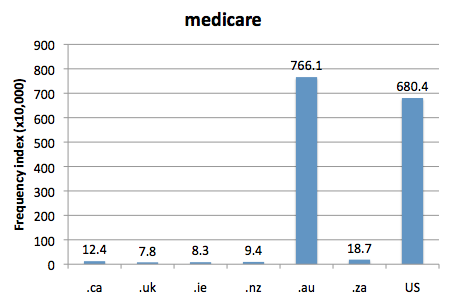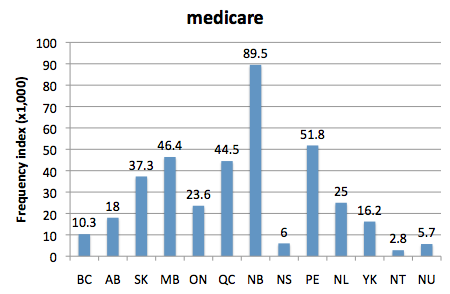Quick links
medicare
DCHP-2 (Jun 2010)
Spelling variants:Medicare
n. & adj. — dated, somewhat rare
universal health care; a government-sponsored insurance program for providing medical care for all residents.
Type: 4. Culturally Significant — Universal health care for all residents developed in a two-stage process in Canada. Starting in 1957, the costs of hospital care was largely covered. By 1966, the Medical Care Act extended universal coverage to doctors, though it took some years for plans to be implemented between the federal and provincial governments.
Health care is under the jurisdiction of the provinces, which allows for varying coverage. In order to qualify for federal payments, the provinces must meet the criteria of "accessibility, universality, comprehensiveness, portability and administration" (Canadian Encyclopedia reference), which creates the smallest common denominator for services rendered to Canadians regardless of location.
Instrumental for federal health care coverage was an insurance model pioneered by Saskatchewan premier Tommy Douglas in 1961, which was answered by a doctors' strike in that province in 1962 (see the quotations from the early 1960s and the 1993 quotation). After a difficult stalemate with the province's doctors, the battle over health care was won by Douglas. By 1972, however, medicare was available in all provinces. In the US, medicare refers to subsidized health care insurance for seniors only.
Universal health care is consistently among the most important topics to Canadian voters, yet, as can be seen in Chart 1, the term medicare is not the term of choice for many Canadians, who generally prefer terms such as universal health care or simply "health care".
See also COD-2, which does not label the term as "Cdn.", but defines it as universal health care with the prefix "(in Canada").
Health care is under the jurisdiction of the provinces, which allows for varying coverage. In order to qualify for federal payments, the provinces must meet the criteria of "accessibility, universality, comprehensiveness, portability and administration" (Canadian Encyclopedia reference), which creates the smallest common denominator for services rendered to Canadians regardless of location.
Instrumental for federal health care coverage was an insurance model pioneered by Saskatchewan premier Tommy Douglas in 1961, which was answered by a doctors' strike in that province in 1962 (see the quotations from the early 1960s and the 1993 quotation). After a difficult stalemate with the province's doctors, the battle over health care was won by Douglas. By 1972, however, medicare was available in all provinces. In the US, medicare refers to subsidized health care insurance for seniors only.
Universal health care is consistently among the most important topics to Canadian voters, yet, as can be seen in Chart 1, the term medicare is not the term of choice for many Canadians, who generally prefer terms such as universal health care or simply "health care".
See also COD-2, which does not label the term as "Cdn.", but defines it as universal health care with the prefix "(in Canada").
In the 1960s and 1970s, medicare was likely the majority term, with New Brunswick holding on to the term the longest, as is implied by its frequent use in that province (see Chart 2). Medicare has since been replaced by plain "health care", which generally implies free access in Canada, as opposed to "private health care".
Note that medicare means different things in Canada ('universal health care') and the US ('health care for seniors'). "Obama Care" would be somewhat of an equivalent term in the US today (2016).
Quotations
1961
"All I said was I'd been reading about the American Medical Association and the medicare plan and all I said was what's wrong with socialized medicine anyway, is all."
1962
Today a doctor was preparing to open a practice in Weyburn. He was on the verge of mailing contracts and leases, but when he learned of the Medicare amendment, he decided to delay his plans.
1962
Doctors wishing to work under Medicare were denied operating facilities, even in grave cases.
1962
The party . . . had no campaign strategy except to . . . stress medicare and nuclear policy on the hustings. . . .
1963
Remember 1962? . . . Medicare joined the language for keeps. . . .
1964
Alberta implemented its own free-enterprise version of medicare -- Albertans call it Manning care -- on Oct. 1, 1963.
1972
His statements have been a factor in the skirmishing between B.C. doctors and the Government for the past six months and the final scene for a showdown is likely to be set today when the B.C. Medical Association announces the results of a referendum among doctors on the question of a Government proposal for an increase in medicare fees that is less than the amount the doctors want.
1986
Ultimately, he believes that the NRC cuts and the outcry following them may produce a positive result. He suggests that a consensus is now building that will make science and technology spending a new sacred cow. He compares it to the consensus on social welfare and medicare that emerged after the Second World War.
1993
Medicare did not come easily. Its birth in Saskatchewan in 1962 was long, drawn out and painful. The CCF government had a mandate to implement a government-sponsored health insurance plan. It was publicly supported by trade unions, church groups, farmers and a substantial element of the intellectuals. The medical profession, despite the voters' wishes, remained "unalterably opposed" to a government plan.
1995
Emmett Hall, who died at 96, was a lawyer, judge and man of the establishment but made his mark by telling society it had to change.
"Canada's human resources, men, women and children, are worth the price that will be paid in taxes in ensuring that all Canadians may enjoy the best health possible," he wrote in a 1964 report given to the federal government. It resulted in medicare, which existed in his native Saskatchewan, being extended across Canada.
2007
I've watched a relative turned away at a Regina hospital (during a stroke) during a strike -- and that person is debilitated for life because the NDP protects the right for all to strike as a higher priority than our collective right to health care. We pay taxes to support medicare. We surely don't pay taxes so that a picket can block the entrance to a hospital.
2009
On Tuesday, MPs Ujjal Dosanjh, Marlene Jennings and Denis Coderre went before the cameras. They criticized the government on various issues, including health care. With Mr. Harper set to meet Barack Obama in Washington tomorrow, Mr. Dosanjh says the Prime Minister should defend Canada's medicare system to the President.
References
- The Canadian Encyclopedia • "Health Policy"
Images

Chart 1: Internet Domain Search, 19 Feb. 2016
